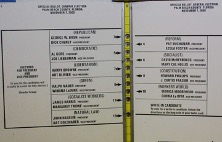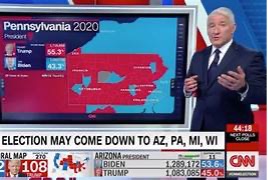The Butterfly Effect – Bush vs. Gore revisited
The year 2000 is perhaps best remembered in the UK for the Millenium Dome, the fuel protests and Y2K. For the US, it would be their first presidential election of a new millennium.
Incumbent Bill Clinton was term limited after winning in 1992 and 1996, meaning there would be a new President
For the Democrats, Vice President Al Gore of Tennessee won fairly comfortably against a challenge from Senator Bill Bradley of New Jersey
For the Republicans, Governor George W Bush of Texas faced a much tighter battle with Senator John McCain of Arizona and only pulled away after Super Tuesday

Al Gore and George W Bush
Recap of Key events
It was a close election.
On election night, the networks first called Florida for Gore based on the exit poll, but as the early results came in strongly for Bush, they retracted and then later called Florida for Bush. At this point, Gore rang Bush to concede.
However, as the results started coming in from the more urban counties of Florida, Bush’s margin narrowed and so the networks (and Gore) retracted.
With all other states declared, the results were:
Al Gore – 266 Electoral College votes
George W Bush – 246 Electoral College votes
This meant that whoever won Florida’s 25 Electoral College votes would win the election.
In the year 2000, Florida used punch cards for voting, which were then counted by machine. After a machine recount, Bush’s winning margin stood at around 300 votes.
A problem emerged with “hanging chads”. A chad is the little circle or square of paper that is left over from hole punching and a hanging chad is when the chad is left partially attached (see image). The counting machines weren’t correctly registering these as votes.

Hanging chads
At this point Gore requested a manual recount of votes in 4 primarily Democrat voting counties: Miami-Dade (Miami), Broward (Fort Lauderdale), Palm Beach (West Palm Beach) and Volusia (Daytona Beach).
Florida law stated that all counting had to be completed by 14th November 2000 (1 week after election night). Volusia completed its recount but the other 3 counties weren’t able to complete in time.
Gore and the 3 counties sued for more time and on November 21st 2000, the Florida Supreme Court allowed an extension to the 26th November. Bush then appealed to the US Supreme Court.
On 12th December 2000, the US Supreme Court, by a 5-4 majority, ordered the recount to stop. For a excellent review of the wider legal issues, see here:
The next day, Gore conceded and it was declared that Bush had won Florida by 537 votes (a 0.009% margin)
So who really won?
After the election, several US academic and media organisations attempted to conduct their own investigations.
The National Opinion Research Center concluded that, if the recounts in the 4 counties had been completed, then Bush would have still won. However, if the entire state was recounted, then Gore would have narrowly prevailed.
There were also several other factors that impacted Florida’s votes:
- Prior to the election, Florida conducted a purge of its voter rolls to remove convicted felons. Some (mainly black) voters were mistakenly removed and turned away at the polls.
- When the networks called Florida for Gore, voting was still open in the heavily Republican Panhandle. This may have deterred some Republican voters who hadn’t yet voted.
- Palm Beach County had a confusing butterfly ballot with candidates on either side of the page (see image). It had a surprisingly high amount of votes for Pat Buchanan, the Reform party candidate, as well as a large number of overvotes (where someone votes for too many candidates). The election official who designed the ballot was actually a Democrat, Theresa LePore, who was nicknamed “Madame Butterfly” by the press. She failed to win re-election in 2004.
A recent New York Times study concluded that the butterfly ballot cost Gore the election

The Palm Beach County Butterfly Ballot
Implications for 2024
The 2024 race looks just as tight as in 2000 and there are a couple of key implications:
Firstly, the US election system still isn’t fit for purpose:
If we compare with the UK system, the election in each area is administered by local authorities, but the Electoral Commission sets the overall rules. This means that in a General Election, the election administration at Aberdeen North, Aberafan Maestag and Aldershot should all be near identical.
In the US, the main issue is that every state (and sometimes within states, every county) is essentially allowed to organise the federal election as it sees fit.
Many states are a mix of mail and in-person voting, but Washington state and Colorado are entirely vote by mail. Pennsylvania requires registration at least 15 days before the election, while in Michigan you can register on the day. In Florida, mail in votes must arrive by 7pm on polling day, while other states allow late arrival, if they are postmarked on election day. Some states require ID to vote, while others don’t.
What this means is that in 2020 it took days for Joe Biden to be confirmed as the winner, even though he finished with a fairly comfortable lead in the Electoral College. If this election comes down to one close state, then it will take even longer and there will definitely be legal challenges.

John King, CNN with a map of Pennsylvania in the 2020 election aftermath
The second implication is around the increased partisanship in US politics.
In my view, every US city should have a statue of Al Gore. He could have tried to fight on by various means (see 2020). If nothing else, he could have spent 4 years carping about how Bush was an illegitimate president. However, Gore did neither of these things. He put the country first and allowed Bush to get on with his presidency in peace.
If something similar happened today, where is our Al Gore?
We know after 2020 that Donald Trump is unlikely to take defeat lying down. But what about if Harris is behind? Unfortunately, history shows us that, if one side in US politics behaves badly, the other side soon follows.
Regardless of partisan preference, let’s hope whoever wins has a comfortable victory in the Electoral College for the stability of the US and the world.
Gareth of the Vale